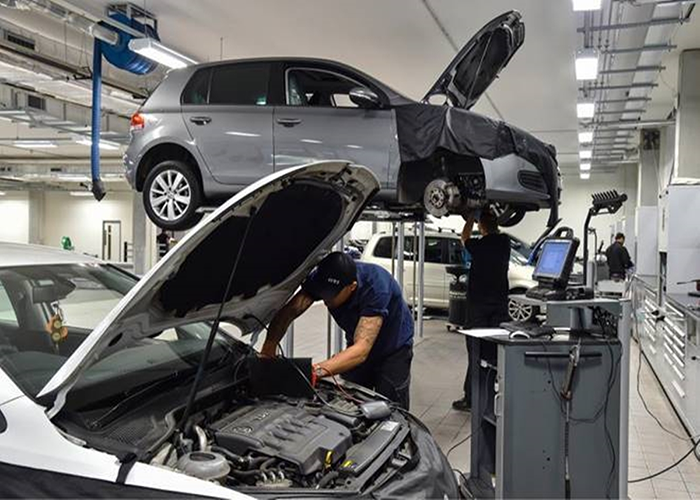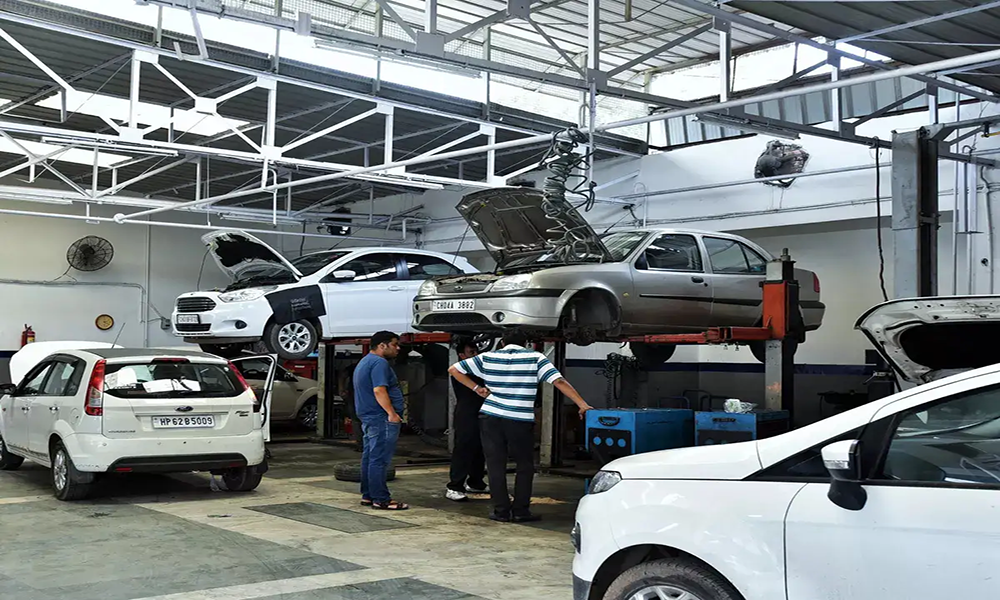Water and Wastewater Treatment in Automobile Service Industries Using ETP, STP, WTP, WWTP, RO, and Recycling Solutions

India's automobile service industry has grown rapidly in recent years, driven by increased vehicle ownership and a rising need for regular maintenance. This industry is critical in ensuring vehicle efficiency, safety, and longevity, from local garages to authorized service centers.
In Maharashtra, one of India's most industrialized states, cities like Mumbai, Pune, and Nagpur host thousands of automobile service stations. These include multi-brand centers, dealerships, and specialized workshops catering to two-wheelers, cars, and commercial vehicles. These service units are highly water-intensive and require robust water management solutions to stay sustainable and compliant with environmental norms.
Water Is Used for Washing, Cleaning, Cooling, and Service Bay Maintenance in Auto Workshops
Automobile service centers depend heavily on water, particularly for washing vehicles, engine cleaning, underbody flushing, and general maintenance. High-pressure washers use significant volumes of water daily to clean accumulated grime, oils, and road dust from vehicles.
Apart from exterior cleaning, water is also used in cooling systems, hydraulic cleaning, and for maintaining clean and safe workshop floors. Service stations may experience shortages or incur high water bills without efficient water management. Therefore, water reuse and treatment have become critical for modern workshops seeking cost-efficiency and eco-conscious operations.
Washing, Engine Cleaning, and Grease Removal Are Main Sources of Wastewater in Service Stations
Several daily operations in service centers generate wastewater. These include vehicle washing, engine degreasing, and cleaning tools or work areas. Each activity produces water contaminated with oil, grease, detergents, and suspended solids.
"In the automobile service industry, water isn't just for cleaning—it's part of the process. Responsible water usage and treatment are essential for efficiency, protecting the environment, and sustaining the business."
Runoff from washing bays and oil spill zones often enters drains, carrying hydrocarbons and heavy metals that pose environmental risks. This wastewater can pollute local water bodies and soil without proper containment and treatment. Hence, service stations need dedicated treatment systems to effectively manage and recycle this wastewater.
Wastewater Contains Oils, Grease, Soaps, Heavy Metals, and Suspended Solids From Cleaning Activities
The wastewater generated in automobile service centers is highly polluted. It typically contains petroleum products like oil and grease, surfactants from detergents, and solids such as sand, dirt, and metal shavings. Some water may also carry coolant fluids and brake dust.
This mixture makes the wastewater both chemically and physically challenging to treat. If discharged untreated, it can block drainage systems or contaminate groundwater. Specialized treatment systems are needed to remove these pollutants before the water can be reused or safely discharged.
Oil Separation, Filtration, and Biological Systems Are Used to Treat Service Station Wastewater
Automobile workshops generally install Effluent Treatment Plants (ETPs) to handle wastewater. The first stage often includes oil-water separators that remove floating oil and grease. Sedimentation tanks then allow heavier particles to settle out, followed by filtration to clear suspended solids.
Some systems use chemical dosing to neutralize harmful substances and biological treatment to break down organic pollutants. Treated water is reused for non-critical applications like floor washing or gardening or safely discharged after meeting environmental standards. Regular maintenance ensures consistent treatment efficiency.
RO, Reuse Units, and Smart Filtration Systems Enable Water Recycling in Auto Workshops
Modern automobile service stations are adopting advanced technologies like Reverse Osmosis (RO), membrane filtration, and fully automated treatment plants. These help reduce fresh water intake by recycling wash water for reuse in cleaning and cooling applications.
Many setups also use online monitoring systems that track real-time flow rates, contamination levels, and treatment performance. Automation reduces labor costs and ensures compliance with pollution control norms. These innovative solutions contribute to sustainability and offer long-term savings.
Customized ETPs, Oil Separators, and Recycling Plants for Auto Workshops Across India and Maharashtra
We offer tailored water and wastewater treatment solutions specifically for automobile service stations. Our systems include compact ETPs, oil separators, grease traps, and advanced RO or ultrafiltration units. These are designed to handle the unique waste profiles of auto-cleaning operations.
We begin with site assessments to understand your operations, followed by customized system design, installation, and maintenance support. Whether you manage a standalone garage or a large dealership workshop, our solutions help reduce water consumption, manage compliance, and improve operational efficiency.
Conclusion: Sustainable Water Solutions for the Automobile Service Industry

Sustainable Water Management in Hospitals Ensures Safety, Compliance, and Environmental Stewardship
While essential to vehicle maintenance, the automobile service industry is a highly water-consuming sector that generates complex wastewater. Efficient treatment systems are vital for maintaining hygiene, complying with environmental laws, and reducing water usage. With rising operational costs and growing environmental concerns, recycling and treating wastewater is no longer optional—it's essential. Our tailored water treatment solutions empower workshops across India and Maharashtra to operate sustainably while meeting performance and cost goals.

